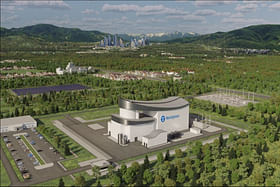The Centre is examining the provisions of the Atomic Energy Act, 1962, to allow participation of private sector and startups to set up small modular reactors (SMRs) in the country.
Union Minister of State for Science and Technology, Jitendra Singh said this while replying to a question in Lok Sabha last week.
SMRs are advanced nuclear reactors with a power capacity of up to 300 MW(e) per unit, which is about one-third of the generating capacity of traditional nuclear power reactors and which can produce a large amount of low-carbon electricity.
What makes them lucrative is that that their systems, structures and components (SSCs) are manufactured in controlled factory environment and then transported to project site and installed, thereby optimising both time and cost.
Factory-built and ready-to-shift, the SMRs require less capital, time and land than conventional reactors, and can also safely be deployed in populated areas
Discussion about modular reactors, or SMRs, has gained momentum in recent months, as they can play a crucial role in achieving energy transition goals effectively — India has pledged to achieve 50 per cent non-fossil electricity generation capacity by 2030.
Given the strategic importance of the sector, the government has kept the private player out of the ambit of operation and fuel management for nuclear power generation.
Under India’s Atomic Energy Act, 1962, the government plays a central role in developing and running nuclear power stations. Domestic private companies are allowed to participate as “junior equity partners” by supplying components and helping build them.
The government is also exploring the options of collaborating with other countries and taking up indigenous development of SMRs. The future course of action will be finalised on the basis of the decision of the government, Singh said.


